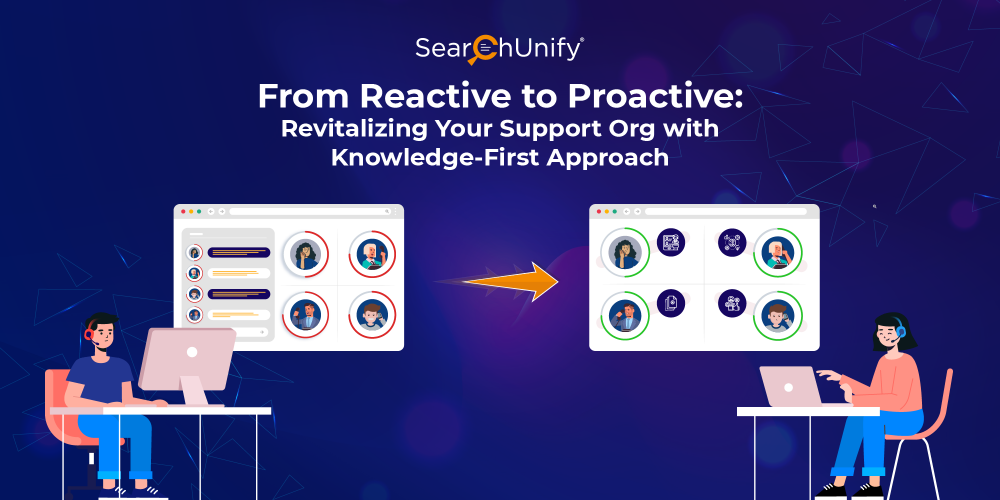
Are your support mavens answering the same question time and again? Or, are they reinventing the wheel by looking for answers to a question that has already been resolved? If yes, then you are not alone in that boat. That’s how most support organizations function nowadays.
Support agents resolve cases reactively; one case at a time. In contrast, support managers spend most of their time on reducing escalations, minimizing turnaround time, improving agent productivity, and boosting customer satisfaction to ensure that agents don’t derail from their track.
Fun Fact: 60-90% of issues that support agents resolve are recurring. And, 98% of support managers’ time is spent on putting out fires, managing escalations, and firefighting.
At the end of the day, you might successfully delight your customers, but it’s futile if the cost is your employee satisfaction. By circling around the vicious cycle of monotonous and rote tasks, support representatives often end up wearing themselves to shadows. This is why your organization needs to shift from a reactive to a proactive approach. Instead of resolving issues reactively, they need to tap into the enterprise knowledge to stay ahead of the game.
Why Transition from Case-First to Knowledge-First Support Model is Crucial?
Operating on a case-first model is equivalent to shoveling sand with a pitchfork. It demands copious amounts of resources, time, money, and effort. So, how exactly do you make your organization scalable without compromising on customer satisfaction? The answer is by adopting a knowledge-first approach.
Knowledge is power. As cliche as it sounds, this adage is particularly true in the current era of well-informed customers. A knowledge-first approach empowers your support agents to provide stellar end-to-end customer experiences while lowering support costs and preventing burnout. What’s more, it ensures that the right knowledge reaches the right people as quickly as possible so that your customers don’t feel neglected. Let’s see how.
- Enhances Agent Efficiency: An effective knowledge-first approach integrates the fragmented data silos to give a 360-degree view of enterprise knowledge. Thus, empowering agents with access to the right information at the right time and significantly bringing down the turnaround time, unnecessary costs, and improving operational efficiency.
- Reduces Repeat Customer Calls: An ideal knowledge-first approach includes rich analytics to provide insights into content performance. Then, the support organization can leverage those learnings to create customer-centric KB articles so that other customers who were likely to contact for the same issue resolve it on their own.
- Meets SLAs: Failing to meet pre-defined SLAs results in high customer churn. With a knowledge-first approach, you can conduct root-cause analysis to identify why certain content doesn’t help the organization meet its SLAs and influence it accordingly by taking the required actions.
Why Organizations Struggle to Make the Switch?
“Change might not be fast and it isn’t always easy. But with time and effort, almost any habit can be reshaped.” – Charles Duhigg
The transition from case-first to knowledge-first demands a lot of organizational changes. This is why support leaders are apprehensive of taking the first step towards making the switch. Additionally, it’s human nature to resist change. Therefore, agents’ resistance and lack of leadership buy-in also hinder this transition.
Secondly, driving the change with outdated technology might take you farther from the goal. Is automation a solution then? Well, no.
“Instead of mindless automation, optimizing processes to get them aligned with your organizational goals sets you on the path to a sustainable customer support model,” says Phil Verghis, CEO of Klever Insight. “However, sometimes, when the process is optimally designed, it becomes unnatural for the organization to follow it. Therefore, you need a strategy to make these changes simple, joyful, and in the workflow for your employees to adopt them,” he further added.
Want to Know the Secret of Implementing these Organizational Changes Smoothly?
Then, join Phil Verghis, CEO, Klever Insight, and Alok Ramsisaria, CEO, Grazitti Interactive (parent company of SearchUnify), for a live webinar on September 15, 2021, at 10:00 AM PST. They will discuss how the right blend of strategy and technology can be your best bet.














